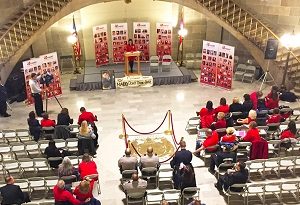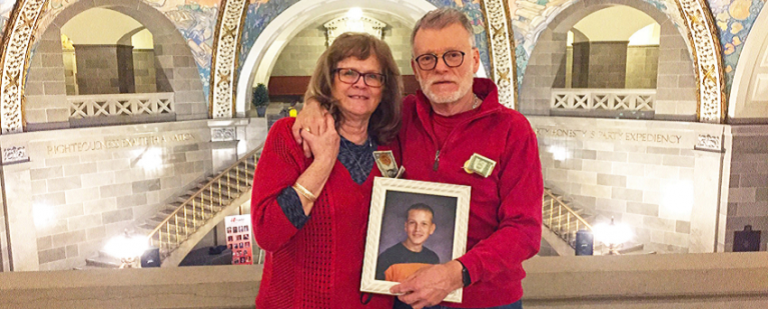AAA joins fight to restore funding for sobriety checkpoints

 After a press conference in the Missouri Capitol rotunda, Pam and Duane Huggins and other MADD volunteers met with legislators to ask them to restore funding for sobriety checkpoints. The Huggins carried a photo of their son, Zach, who was killed in a drunk driving crash in 2005.
After a press conference in the Missouri Capitol rotunda, Pam and Duane Huggins and other MADD volunteers met with legislators to ask them to restore funding for sobriety checkpoints. The Huggins carried a photo of their son, Zach, who was killed in a drunk driving crash in 2005.
Missouri lawmakers eliminated funding for sobriety checkpoints last year, so AAA recently joined a campaign organized by Mothers Against Drunk Driving (MADD) to restore the important law enforcement tool.
Not long after this year’s legislative session began, the Club’s Public Affairs department participated in a rally at the Missouri Capitol in Jefferson City, Mo., which was attended by representatives of MADD from across the state, as well as law enforcement officers and the national president of MADD. The event, which garnered local media attention, was designed to inform legislators of the need for more resources to fight impaired driving,
“Approximately one of every four fatal traffic crashes on Missouri’s roads is caused by impaired driving,” said Denny Heinze of the Public Affairs department, who attended the rally. “In 2016 alone, 219 people were killed and 669 seriously injured in crashes that involved an impaired driver. Drunk driving is a significant problem, and our officers need all the help they can get to fight it.”
After a press conference in the Capitol rotunda, MADD volunteers fanned out into the building to meet with legislators and drop off packets of information about the issue, including a letter from AAA imploring them to bring back sobriety checkpoints. The General Assembly slashed funding for the checkpoints to just $1 last year, and they are expecting to do the same this year.
Among the MADD volunteers who shared their stories with lawmakers in the hopes of changing their minds was Pam and Duane Huggins of St. Charles, Mo. Pam, who works in the Claims department at HQ, has been a vocal advocate with Duane for strong drunk driving laws since their son, Zach, was killed in 2005 when he was a passenger in a car driven by an intoxicated driver.
In the incident, the driver lost control of his car, which jumped a curb and struck a utility pole on the passenger side. The driver was thrown into the back seat of the car and was relatively unscathed, but Zach died from head injuries. The driver, who was Zach’s friend and was supposed to be the designated driver that night, pleaded guilty to involuntary manslaughter and was sentenced to a year in jail.
“There are consequences to driving impaired, and none of us should have to live with the consequences of someone’s poor choice to drink and drive,” said Pam. “Everyone knows what could happen if you choose to drink and drive: injure someone, damage property, and even worse, kill someone. Yet people continue to do it thinking ‘I won’t get caught.’ ”
As a volunteer with MADD, Huggins has spoken at high schools about making the right choice when it comes to drinking and driving. She has also shared their story at victim impact panels, which is a court-ordered program to help drunk and drugged driving offenders recognize and internalize the lasting and long-term effects of impaired driving.
In addition, the couple has staffed the MADD booth at concerts, malls, fairs and more to educate the public about drunk driving. They also have been to the Missouri Capitol more times than they can remember to advocate for legislation involving drunk driving. They plan to visit again in the coming weeks to continue the discussion on sobriety checkpoints.
“We know that the legislators want to do the right thing for the constituents of their districts, but they do not fully understand what tools the police departments need and use to fight impaired driving,” she said. “Taking away the checkpoint from the DWI enforcement tool box is like giving an officer a car with no keys and saying, ‘Go catch the bad guys.’ It makes no sense.”
